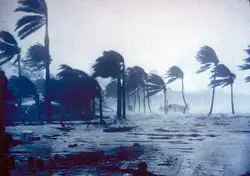
Hurricane season begins today, and with it comes the annual ritual of predicting how many storms we’ll get and offering tips to residents and travelers in hurricane-prone locales. But this year comes with added tension, thanks to the massive Gulf oil spill that happens to be located squarely in hurricane country.
So, what happens to an oil slick when a massive hurricane churns the seas? What if crews are still battling the blowout when a storm enters the Gulf?
The Weather Channel has the answers to some of these questions, via the National Oceanographic and Atmospheric Administration (NOAA). First, churning seas and high winds in the Gulf will likely disperse the oil over a broad area. This is good and bad. On one hand, a larger slick obviously increases the threat to land, and storm surges could push this dispersed oil ashore. But according to the NOAA, dispersion “can help accelerate the biodegradation process.”
The positioning of the hurricane is also incredibly important. Since hurricanes rotate counter-clockwise, a storm located east of the slick will generally push the oil away from the coast. A storm positioned to the west will generally push it onshore.
There’s also a theory that the oil could weaken storms, or at least prevent them from strengthening over the Gulf. Hurricanes pull moisture from the ocean, and the idea is that oil in the water and on the surface could hamper this process. However, this effect would likely be nullified if the oil is dispersed too much. The slick is also very small in comparison to a typical hurricane, and therefore may not exert much influence either way.
As for cleanup efforts, most, if not all, boats will have to come in from the open water, and strong winds, waves, and storm surges will almost certainly displace or destroy booms and berms set up to protect fragile wetlands and coastal areas.
But what about those storm predictions? Unfortunately, the NOAA is predicting a busy Atlantic season, with 14 to 23 named storms (storms with sustained winds over 39 mph), eight to 14 hurricanes (sustained winds above 74 mph), and three to seven major hurricanes (sustained winds over 111 mph). None of this guarantees a storm will enter the Gulf, but a busy season would mean a greater chance of landfall.
We hand-pick everything we recommend and select items through testing and reviews. Some products are sent to us free of charge with no incentive to offer a favorable review. We offer our unbiased opinions and do not accept compensation to review products. All items are in stock and prices are accurate at the time of publication. If you buy something through our links, we may earn a commission.
Related
Top Fares From
Today's Top Travel Deals
Brought to you by ShermansTravel
Greece: 9-Night Vacation, Incl. Meteora &...
Exoticca
 vacation
$2099+
vacation
$2099+
New Year Sale: Luxe, 9-Nt Alaska...
Oceania Cruises
 cruise
$3599+
cruise
$3599+
Ohio: Daily Car Rentals from Cincinnati
85OFF.com
 Car Rental
$19+
Car Rental
$19+



